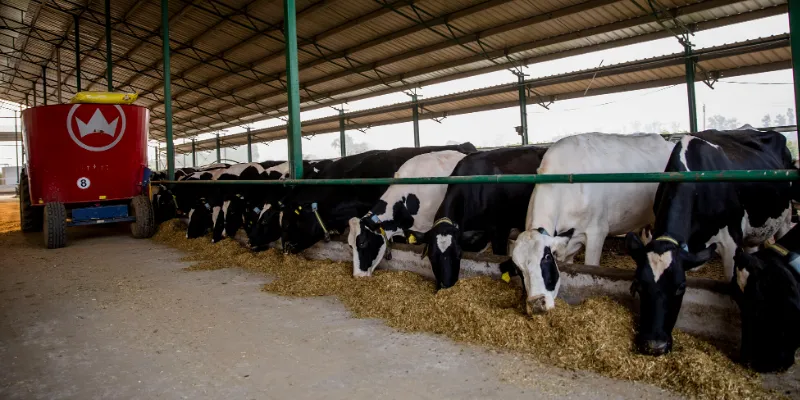How this woman entrepreneur’s search for pure cow’s milk led to a startup that now clocks Rs 7 Cr in revenue
Delhi-based startup Whyte Farms, co-founded by Kanika Yadav sells unadulterated milk that is chilled, pasteurised, and packaged at its 30-acre farm, and delivered fresh within eight to 12 hours at Rs 75 per litre.
A quest for healthy and pure cow’s milk led Kanika Yadav to be a dairy farmer and start , a dairy startup clocking revenue in crores today.
The Delhi-based entrepreneur says she grew up drinking pure cow’s milk from cattle at home till she was 28 years old. However, Kanika’s family had to give away the cattle at home in Rajokri, New Delhi in 2014 when she was working as a progressive educator.
Recalling her search for regular supply of quality milk, she says, “The quality of milk in the capital is bad, despite India being the largest producer of milk in the world. The packaged milk is not fresh and comes through long supply chains. With the local doodhwala, we were concerned about hygiene and what the cattle were fed. I researched and even tried imported milk in tetrapacks that cost Rs 300 per litre.”
The inability to find milk she had been drinking for 28 years led her to start Whyte Farms in 2015, along with co-founder Sanjeev Yadav.

Kanika Yadav, Co-founder of Whyte Farms
Becoming a dairy farmer and entrepreneur
Kanika was part of a field research to understand employment in villages in and around Delhi, which made her decision to start up even firmer.
In the course of this research, when most households of Kadarpur village reported selling milk as the economic mainstay, Kanika couldn’t help but point out that she did not see a single cow in their homes. Kanika was told that the cattle are left to graze and would return in the evening.
“Most villagers are unable to take care of the cattle even though a lactating animal requires immense nutrition. When the cattle are left to roam on their own they end up eating garbage including plastic, and the milk will not be nutritious even if the farmer's not a crook and gives unadulterated milk,” Kanika says.
She adds the quality is further compromised by the long process that takes at least four days before the milk packet reaches a consumer’s house. To be precise, the cow’s milk starts developing bacteria immediately and is chilled to avoid spoilage. It is then transported to the pasteurisation and processing unit in the city and further distributed to shops.
While it is no longer fresh, most milk – as much as 68 percent of milk and milk related products – are also adulterated with detergent, caustic soda, glucose, white paint and refined oil. Other contaminants are mixed to preserve the milk as well.
Whyte Farms claims to be the healthier alternative, with all the processes from chilling, pasteurising, and packaging taking place at its 30-acre farm in Tijara, located 90 km from Delhi.
Packaged in glass bottles, the milk is delivered to more than 3,000 households within 8 to 12 hours of the cows being milked, without the help of any external agency.
While packaged milk may not spoil quickly due to high preservatives, she says that Whyte Farms milk has no preservatives and will become rancid within two hours, if left outside.
Priced at Rs 75 per litre, the startup caters only to the Delhi-NCR region at present and hopes to provide the service to households in Noida as well.
Bootstrapped so far, the startup dedicated a year to research and setting up the farm before starting delivery in January 2017. Having infused an initial investment of nearly Rs 4 crore, it reaps an annual revenue of approximately Rs 7 crore.

Cattle at Whyte Farms's 30-acre farm in Tijara, Rajashtan
To ensure cattle is healthy, the duo sourced 200 calves and raised them at the farm where fodder was also grown. The farm also has a massage station for the cattle as well.
In the next three months, the startup hopes to supply paneer (fresh cottage cheese) and curd as well.
Navigating the market
With little agricultural knowledge, the entrepreneurs say setting up the farm and taking responsibility of the cattle has been quite a task, even with a professional veterinarian on board. They studied animal husbandry, the cycles, and how to rear certain breeds.
Another challenge they faced was the initial lack of acceptance from customers. Many people were used to big milk brands and trusted them. “Though I would educate them about the preservatives in big brands and the processes involved, people were sceptical to switch,” she says.
Hence, Kanika believes that more startups entering the space has helped gain a certain credibility and does not see emerging dairy startups as immediate competitors.
The entrepreneurs are happy at the pace at which it's growing, reaching 250 customers in the first year, to keep up with cattle’s cycle of milking as well.
Slowly, but steadily, its aim is to make a difference in Indian households, one bottle of milk at a time.
Edited by Rekha Balakrishnan









